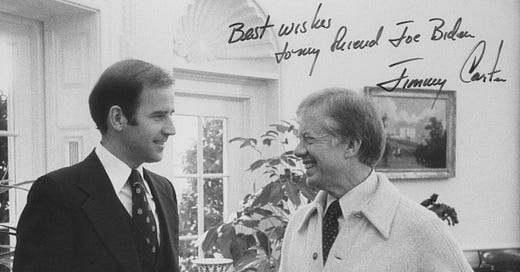Jimmy Carter and the end of democratic capitalism
The myth and reality of our 39th president
Friends,
I’m honoring Presidents’ Day by sharing with you some thoughts about Jimmy Carter, who is now in hospice care.
Carter’s administration marked the end of 45 years of democratic capitalism, whose goal had been to harness the private sector for the common good.
It’s important to understand what happened and why.
For years, the rap on President Carter has been that his presidency failed yet his post-presidency was the best in modern history.
This is way too simplistic.
Carter’s life after his presidency was exemplary for the same reason he was elected president after the disasters of Richard Nixon and Nixon’s vice president, Gerald Ford (who unconditionally pardoned Nixon for any crimes he may have committed): Carter’s modesty, decency, and humanity.
Not only were these traits the opposite of Nixon’s, but they would shine even brighter 40 years later in contrast to the loathsome Donald Trump.
One-term presidents are always presumed failures because voters didn’t reelect them. But Carter lost his reelection bid (as would George H.W. Bush 12 years later) not because his presidency failed but because the Federal Reserve Board hiked interest rates so high as to bring on a recession. Recessions do not just choke off inflation; they also choke off presidencies.
During Carter’s term of office, the OPEC oil cartel raised oil prices from $13 a barrel to over $34, resulting in double-digit price increases across the economy. Paul Volcker, Carter’s appointee as Fed chair, was determined to “break the back of inflation” by hiking interest rates to nearly 20 percent by 1981, bringing on a deep recession and causing millions of people to lose their jobs — including Carter.
It was not Carter’s fault that democratic capitalism ended with him. To the contrary, he appointed many consumer, labor, and environmental advocates to his administration.
Full disclosure: I was a Carter appointee, but met him only twice, once at a Rose Garden ceremony and years later at a dinner party at the home of Sen. Dianne Feinstein. (He was uncharacteristically late for dinner but made a surprise entry, coming down the stairs from a bedroom where he had taken a nap. He apologized profusely, making two un-Trump-like concessions in a single sentence: “I’m getting old and need my nap,” he said with a self-effacing grin, “but I should have told someone I was heading upstairs.”)
Many of his initiatives — ending funding for the B-1 bomber, seeking a comprehensive consumer-protection bill, proposing broad-based tax reform, opposing traditional “pork barrel” spending, establishing a “superfund” to clean up toxic waste sites, and deregulating the airline, trucking, and railroad industries (resulting in lower transportation costs for industry and consumers) — were commendable.
But much of what he did seemed to justify Lewis Powell’s warning to corporate America in a 1971 memo to the U.S. Chamber of Commerce that corporations must bulk up their lobbying muscle in Washington or suffer political defeat.
The untold story of the Carter years is the vast increase in corporate political firepower during this time. Trade associations, law firms, lobbying firms, political operatives, and public-relations specialists swarmed Washington, offering executives so much money that most retiring members of Congress also became lobbyists.
The city went from being a sleepy if not seedy backwater to the hub of America’s political wealth — replete with tony restaurants, upscale hotels, expensive bistros, and 25-bedroom mansions (one of them now owned by Jeff Bezos), and bordered by two of the richest counties in the nation.
With the defeat of Carter’s consumer protection legislation in 1978 at the hands of corporate lobbyists, Richard Lesher, then president of the U.S. Chamber of Commerce, presciently boasted that: “30 to 40 years from now people will look back and say ‘These were the years when the transition took place.’ … We're waking up. And big business is going to be in the forefront of this drive.”
Perhaps Carter could have staved this off had he been more politically cunning, but I doubt it. After 45 years playing defense, corporate America was eager to grab back the reins of power. Despite his best efforts, Carter paved the way for Ronald Reagan — and America’s return to the corporate capitalism that had dominated the nation before the Great Depression and Franklin D. Roosevelt.




Congratulations on a brilliant summary of our political history. It was my privilege to have cast a ballot for Jimmy in Vail, Colorado - Gerald Ford's second home location. I will always associate Reagan's election with Nixon's twelve years earlier. Just as the Iran hostages were "magically" released on Reagan's inauguration, Nixon was elected after the Paris peace talks were sabotaged by his back-channel assurances he'd make a better deal. And my oh my, decades later, look who helped Trump get elected? Why, it was the Rooskies! In the interim, can somebody tell me why Bush let the royal Saudis fly home while the rest of our airspace was shut down after 9/11? Meanwhile, Democrats are constantly disparaged as suspiciously unpatriotic or unAmerican, and Jimmy was painted as weak by the flag-waving Reaganauts. Kushner is getting billions from the Arab petro-sheiks, but we're gonna get dragged into Hunter Biden's laptop again. The corporate class is funding the distraction, as always.
Carter’s lasting achievement was instilling the concept of human rights in international relations. Protecting human rights is a basic objective in diplomacy today even though authoritarian regimes reject that ambition. But Carter created the foundation which calls China to account for its abuses . That challenges Middle Eastern policy both for Israel’s treatment of the Palestinians and Saudi Arabia ‘s treatment of Hutus. Human Rights is the now the key consideration in diplomatic discourse. Fulfilling Carter’s ambition is a distant goal. But Jimmy Carter began a conversation fundamental to Liberty and Justice for all the World’s people . Americans should be proud of him for that.